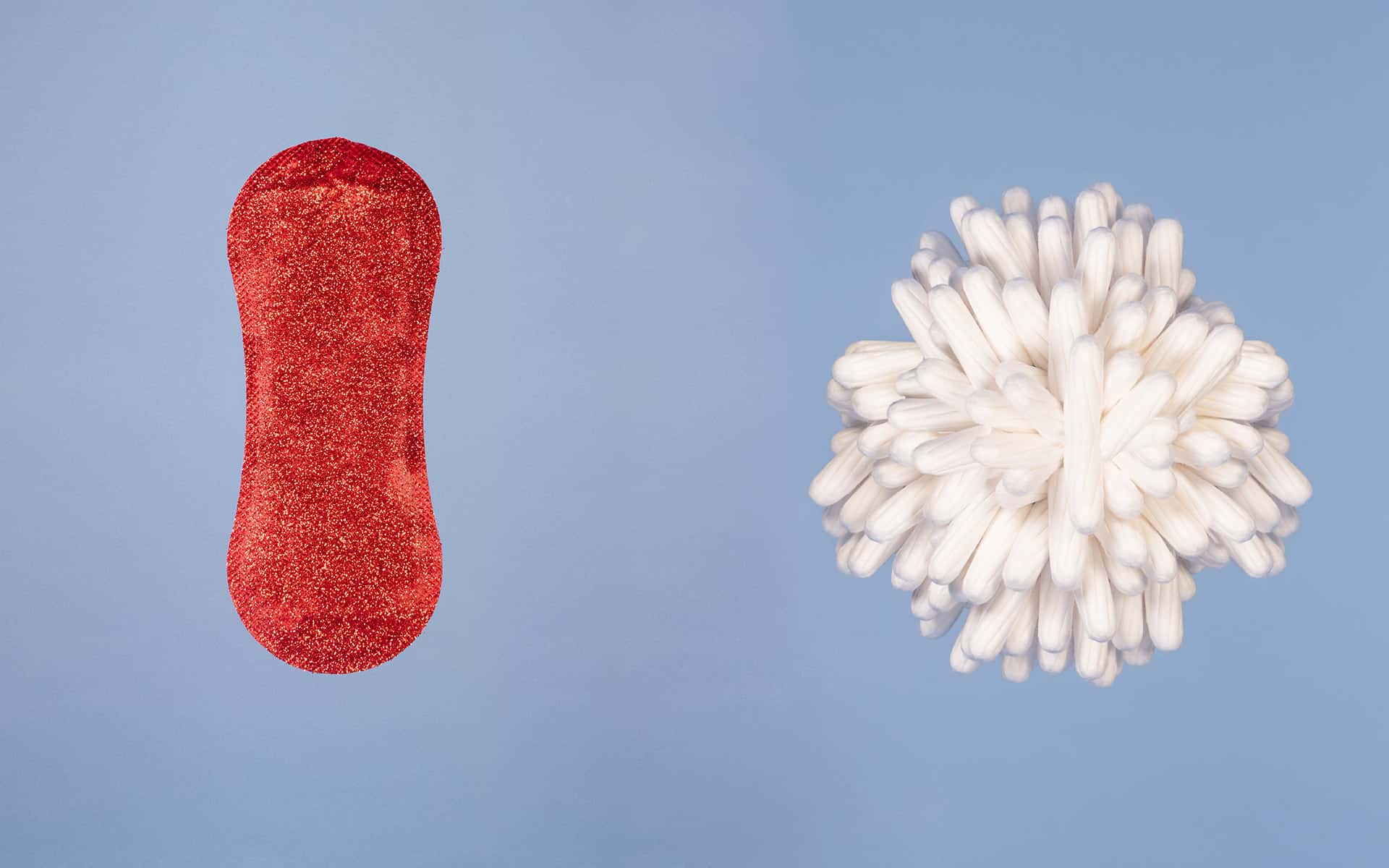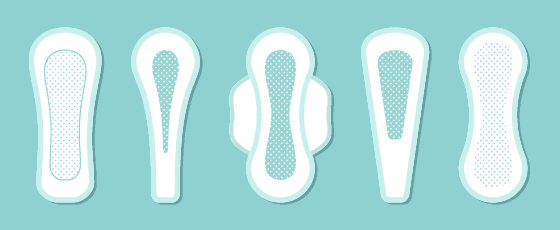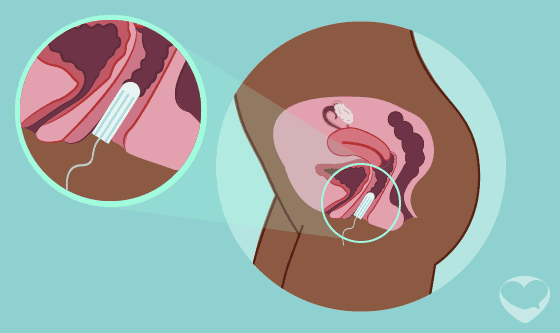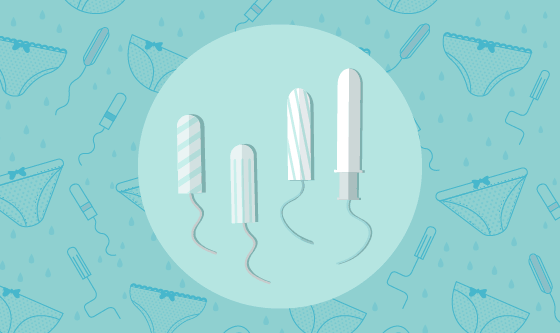
Pads and tampons
The two most common products to absorb the blood during your period are pads (also called sanitary pads, sanitary towels, sanitary napkins, or maxi pads) and tampons.
Both pads and tampons absorb blood during your period. You wear pads in your underwear, and they soak up the blood when it comes out of your vagina.
You put tampons inside your vagina, and they soak up the blood before it comes out. They both work well, so it’s up to you to decide what you find most convenient.
Pads
Pads come in different shapes and sizes which you can use depending on how heavy your menstrual flow is. Some pads come with ‘wings’ or side tabs that offer extra protection against leakages.

Examples of different pads:
Light flow (or back up for a tampon): Thin pad
Names: Pantyliner, thong liner, pad labelled thin, or slender
Normal flow: medium pad
Names: Regular, Regular with wings, long
Heavy flow: bigger pad
Names: heavy, super, or overnight
How to use a pad:
- Take the pad out of its packaging
- The side where the paper peels off the pad will be sticky
- Press the pad, sticky side down, into the crotch of your underwear
The pad will be under your vaginal opening when you pull up your underwear and will absorb the blood that comes out.
Change your pad every three to four hours, or more often if your menstrual flow is very heavy. This is important to prevent smells, stains on your clothing, or possible vaginal infections.
Avoid scented pads – they may irritate the vulva or the vaginal opening.
Wrap used pads in toilet paper or tissue and put them in the rubbish bin.
Tampons
You insert tampons into your vagina, so they’re right out of the way. They’re particularly useful for swimming or doing sports.

To help you put them in, tampons may come with an applicator. This is a plastic or cardboard tube around the tampon with a thinner tube inside it to push the tampon up into place. Tampons also come without an applicator, and then you just push them up with your finger.
They come in different sizes (slender, regular, super, super plus) which you can use depending on how heavy your menstrual flow is.

Examples of tampons
Light flow: Slender, junior, mini, or light
Good for girls who’ve just started to use tampons or light menstrual flow.
Medium flow: Regular
Heavy flow: Super and super plus
Avoid scented tampons because they may create irritations that lead to yeast infections.
Tampons usually come with instructions in the box, which you should read carefully the first time you use them.
You have to replace tampons regularly – every four to six hours or more often if you have a heavier period. If you don’t change tampons regularly, there’s a chance you could get toxic shock syndrome.
If it’s your first time using a tampon, it’s a good idea to start with the smallest size. Also, it’s easier to insert a tampon when your menstrual flow is moderate to heavy.
Don’t worry if it takes more than a few times to get the hang of putting a tampon in. The more you practise, the easier it gets.
Most girls who wear tampons don’t feel them. If you do, it may mean that your tampon isn’t properly inserted, so you should take it out and try again.
Guidelines for inserting a tampon with an applicator
1. Wash and dry your hands (you don’t want to introduce unwanted germs to areas that are very sensitive)
2. Unwrap the tampon.
3. Most tampons have two tubes around them. A thinner inner tube and a thicker outer tube, which make up the applicator. The thinner tube is used to push the tampon into the vagina.
4. Hold the middle of the tampon – where the inner tube meets the outer tube. Make sure you can see the string dangling out of the inner tube.
5. Sit or stand in a comfortable position. Some girls prefer to place one leg up on a toilet seat or bathtub, while other girls prefer to squat.
6. With one hand, open your labia.
7. Using the other hand, direct the outside tube of the tampon into the vaginal opening. Aim for the small of your back.
8. Gently push the tampon into the vaginal opening until your fingers touch your body.
9. Still holding on to the middle of the applicator, use your index finger to push up the bottom half of the applicator – the inner tube with the string dangling out of it. You will feel the tampon pushed through the applicator.
10. Once the inner tube is in all the way, and the string is hanging out of your vaginal opening, pull the applicator out.
Tip
It’s harder to put in a tampon if you’re nervous or tense. Try to relax when you insert it – though this can be hard if you’re feeling nervous about it. You can also try using a bit of lubricant on the top of the tampon applicator or the tip of the tampon.
How to remove a tampon
1. Hold the string hanging out of your vagina
2. Gently pull it down
3. Wrap the tampon in toilet paper or a tissue and put it in the rubbish bin.
4. Put in a new tampon if necessary
Toxic shock syndrome
Toxic shock syndrome (TSS) is a disease caused by bacteria. It can be fatal, but it’s very rare. One way you can get toxic shock syndrome is by leaving a tampon in too long.
You should change your tampon regularly every three to four hours. You should also use the least absorbent tampons you can – so don’t use a ‘super’ tampon if you’ve only got a light flow.
Possible symptoms of TSS:
- Sudden high fever
- Headache
- Diarrhoea
- Aching muscles
- Faintness and tiredness
- Passing less urine than normal
- A rash like a sunburn appearing within 24 hours
- Bloodshot eyes
If you’ve had a tampon in for a long time, perhaps because you forgot to change it, and you get any three of these symptoms, call your doctor immediately. Stop using tampons and switch to pads.
Tampon FAQs
Can I pee with a tampon in?
Yes. There are different openings for urine and menstrual blood to leave the body. Urine comes out of the urethra and menstrual blood comes out of the vaginal opening.
Can I use a tampon if I’m a virgin?
Yes. Some women who have not had vaginal sex may have a thin skin that stretches across part of the vaginal opening, called a hymen (see the section on the Hymen). Sometimes this makes it hard to put up a tampon. To make it easier, you can try putting a finger or tampon in your vaginal opening and moving it from side to side to stretch the hymen a little.
Will I lose my virginity if I use a tampon?
No. Most people agree that you only lose your virginity when you have vaginal intercourse (penis inside the vagina). Some people think you also lose your virginity if you have anal intercourse (penis inside the anus) or oral sex (penis in the mouth). But to lose your virginity you have to have sex, not just use a tampon. See the section on the hymen and virginity.
Can I sleep with a tampon in?
Some health care professionals say it’s best not to use tampons at night because of the rare risk of toxic shock syndrome.
Can I have sex with a tampon in?
You can’t have intercourse with a tampon in. Wearing a tampon during vaginal sex can be painful and dangerous. The penis could push the tampon too far inside the vagina. It could go right up inside the cervix, and be difficult to remove. You can have any other kind of sex with a tampon in, as long as nothing goes inside your vagina.
What happens if I can’t find the string to pull out my tampon?
Sometimes your tampon and the string can accidentally get pushed further into your vaginal opening.
Try squatting down and put your index finger and your thumb into your vaginal opening. Move your fingers back and forth to feel for the string of the tampon. If you feel the string or the tampon, grab it and pull it out.
If you can’t feel the tampon, go to see a healthcare professional straight away. You should never leave a tampon inside you for more than eight hours because of the risk of toxic shock syndrome.

Updetaing me email.com
Updetaing me email.com
Hey, What can we do for you?
Hey, What can we do for you?
This article was really…
This article was really helpful
Hello Aideeee sams, we are…
Hello Aideeee sams, we are so glad and will continue to provide you with more insightful and informative articles! Have a wonderful week and stay safe!
My periods comes after one…
My periods comes after one and a half month, is that a problem
Hi, A cycle can last between…
Hi, A cycle can last between 21 and 42 days. This just means you have a slightly longer cycle. Check out this article;- https://lovematters.co.ke/our-bodies/female-body/menstruation
when can i start my mestral…
when can i start my mestral after giving birth
Hey Lossyy, It depends on…
Hey Lossyy, It depends on whether you are exclusively breastfeeding your baby or not. If you are not, periods can resume anywhere between five weeks and three months. If you breast feeding exclusively it will then take even longer for periods to resume.
Whenever i have sex with my…
Whenever i have sex with my guy after he has cum the penis stops to erect.even when we have not finished having sex.what could be the problem?
Hi Cindy, it is completely…
Hi Cindy, it is completely normal for a man to loose his erection after ejaculating and not get an erection for sometime after. However, if this happens too soon or in some cases, when it takes too long, it maybe a concern. It appears your partner maybe ejaculating sooner than you wish, there are a few things he can do to last longer. Check out the following articles for more information;-
https://lovematters.co.ke/making-love/sex-problems-how-to-overcome-them/how-to-overcome-premature-ejaculation
https://lovematters.co.ke/making-love/orgasms/her-orgasms
Can a virgin use tampons?
Can a virgin use tampons?
Hey Carol, most certainly, a…
Hey Carol, most certainly, a virgin can use tampons. Tampons are worn inside the vagina and are designed to swell inside as it absorbs the flow. If inserted properly, you shouldn’t be able to feel that you have one on. Check out the following article;- https://lovemattersafrica.com/our-bodies/female-body/pads-cups-and-tampons
Is it safe to have sex when…
Is it safe to have sex when you are on your periods?
Hi there, Talking from a…
Hi there, Talking from a purely medical point of view, sex during menstruation is totally fine. It even has a lot of benefits for both partners. There is a small chance that one could get pregnant if they have unprotected sex. Check out the following article for more information;- https://lovemattersafrica.com/our-bodies/female-body/sex-during-your-period-top-five-facts
Can you get pregnant when…
Can you get pregnant when you have sex in your last day of the period and he ejaculates in you??
Hello Cindy, thanks for…
Hello Cindy, thanks for reaching out. The truth is you could fall pregnant at any point of your cycle. safe days are one of the most unreliable ways to prevent pregnancy, and we really don’t recommend it at all. When your safe days are really depends on the length of your cycle. Technically speaking, the first seven days before and after your period, as well as the time of your period, are relatively safe. But, if you have a shorter cycle (shorter than 28 days), or an irregular one, this will vary. Also keep in mind that sperm can survive for up to five days and longer inside the body- so even if you have sex on a ‘safe’ day, you can still get pregnant, because the sperm survived until your ovulation date. So you see, it’s very inaccurate. And lastly, of course, this won’t protect you from STDs. Only condoms will. So we really recommend a more reliable method.
I didn’t understand my…
I didn’t understand my menstrual cycle at all at times two times a month and I can also see it first week of the month and the next month is third week
Hi Ruth, thank you for…
Hi Ruth, thank you for reaching out to us and we are sorry you are going through a hard time.
Many things can cause irregular periods. Changes in your body’s level of the hormones estrogen and progesterone can disrupt the normal pattern of your period. That’s why young girls going through puberty and women approaching menopause commonly have irregular periods.
Other common causes of irregular periods include having an intrauterine device (IUD), changing birth control pills or using certain medications, too much exercise, Polycystic Ovary Syndrome (PCOS), pregnancy, or breastfeeding, stress, overactive thyroid (hyperthyroidism) or underactive thyroid (hypothyroidism), thickening of or polyps on the uterine lining, or uterine fibroids. A less common cause is severe scarring (adhesions) of the lining of the uterus, a condition that doctors call Asherman syndrome. The best thing to do is to reflect on the above and visit a doctor if it persists. Have a wonderful weekend ahead and stay safe!
Where can I get this tampons
Where can I get this tampons
Hello Ella, thank you for…
Hello Ella, thank you for reaching out to us and asking a great question. Your best bet is to visit your nearest supermarket or pharmacy and they should be readily available for purchase. Have a wonderful weekend and stay safe.
When having sex with your…
When having sex with your partner and you are not satisfied is it healthy for your man to finger you or you finger yourself until you satisfied.
Hi Vicky,
Absolutely! As…
Hi Vicky,
Absolutely! As long as the fingers are clean! Go ahead and get your satisfaction just the way you want it served.
Remember! In the same way you wash your hands to avoid getting sick, washing your hands before fingering reduces your risk of infection.